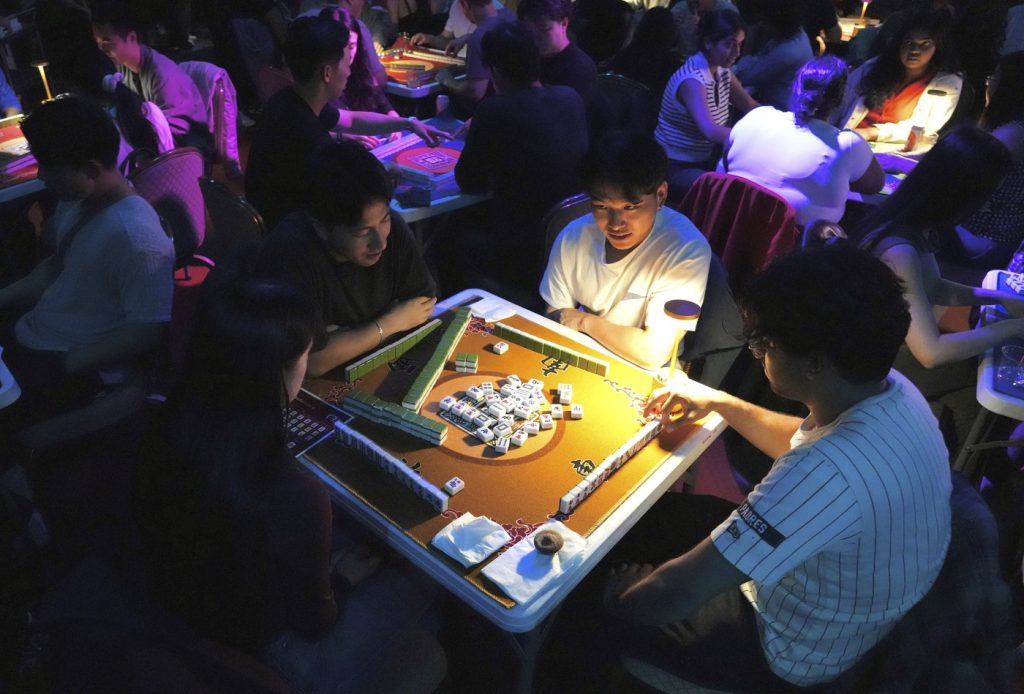World
Mahjong Nights Ignite Social Scene in San Francisco Bars

San Francisco has become a vibrant hub for mahjong enthusiasts, with the classic Chinese tile game gaining traction among a new generation of players. Ryan Lee, a 25-year-old Chinese American, sparked this trend two years ago when he hosted mahjong nights in his apartment. His gatherings quickly grew in popularity, leading him to establish the Youth Luck Leisure (YLL) Mahjong Club and organize pop-up events at various bars and restaurants across the city.
These events attract a diverse crowd, with participants eager to socialize away from screens. Lee’s mahjong nights now feature up to 30 tables and accommodate around 200 guests every two weeks. The atmosphere is lively, complete with live DJs, custom cocktails, and opportunities to meet new friends. Instructors are available to guide newcomers, making it accessible for those unfamiliar with the game. “A lot of people are just really intrigued even though they don’t really know how to play,” Lee said. “There’s a cultural component they’re trying to connect with. It’s kind of like a cultural nostalgia.”
According to Eventbrite, there was a staggering 179% increase in mahjong events in the United States from 2023 to 2024, reflecting a broader trend of young people gravitating towards traditional activities. This surge in interest aligns with the growing appeal of “grannycore” hobbies, including baking workshops and needlework circles.
A Game of Community and Heritage
Mahjong, which requires four players to draw and discard tiles to create a winning hand, is not merely a game of skill; it is also a social activity that fosters community. Nicole Wong, a writer and audio producer based in Oakland, emphasized the tactile nature of the game. “It’s a really tactile game, and it’s really a social game. It really easily builds community among people,” she explained. Wong, who learned mahjong during visits to her Chinese grandparents in New Zealand, has created her own initiative called The Mahjong Project, which includes an instructional guide and an oral history project. This project led her to publish “Mahjong: House Rules from Across the Asian Diaspora,” an illustrated book exploring the game’s history and strategies.
Wong noted a shift in the Asian American community’s approach to cultural heritage, stating, “There’s interest in connecting to your heritage and your culture in a way that was not the case when I was growing up.” This sentiment resonates with many participants at YLL Mahjong Club events, where attendees find both enjoyment and a connection to their roots.
YLL Mahjong Club has successfully hosted nearly 20 events since its inception last year, providing local restaurants and bars with increased business opportunities. Lee, who is also a management consultant in business school, sees the growing popularity of mahjong as an indication of a desire for community spaces. “The demand is rising,” he noted. “It’s not just an interest to learn how to play mahjong, but to find a third space or another community to do things with.”
Connecting Generations Through Mahjong
Joyce Yam, the club’s sponsorship manager, expressed enthusiasm for the events, which often sell out quickly and have long waiting lists. “We welcome people who have no experience at mahjong at all, and we have teaching assistants who guide them. They love it so much that they keep coming back,” she said.
One of those returning participants, Ethan Vuong, moved to San Francisco from Florida and began playing mahjong with friends to connect with his Chinese heritage. Vuong is now a regular at both the YLL Mahjong Club events and Oakland’s Baba House, where he volunteers to teach newcomers. “It’s not just a skill or mechanics-based game; it’s an expression of your personality,” Vuong remarked. His goal is to improve his skills enough to one day win against his grandmother, a testament to the personal connections formed through the game.
As mahjong continues to flourish among young adults in San Francisco, it represents more than just a pastime. It is a bridge connecting generations, fostering community, and celebrating cultural heritage in an increasingly digital world. The rise of mahjong nights not only enhances the social fabric of the city but also revitalizes an ancient game, ensuring its legacy for years to come.
-

 Science3 months ago
Science3 months agoToyoake City Proposes Daily Two-Hour Smartphone Use Limit
-

 Top Stories3 months ago
Top Stories3 months agoPedestrian Fatally Injured in Esquimalt Collision on August 14
-

 Health3 months ago
Health3 months agoB.C. Review Reveals Urgent Need for Rare-Disease Drug Reforms
-

 Technology3 months ago
Technology3 months agoDark Adventure Game “Bye Sweet Carole” Set for October Release
-

 World3 months ago
World3 months agoJimmy Lai’s Defense Challenges Charges Under National Security Law
-

 Lifestyle3 months ago
Lifestyle3 months agoVictoria’s Pop-Up Shop Shines Light on B.C.’s Wolf Cull
-

 Technology3 months ago
Technology3 months agoKonami Revives Iconic Metal Gear Solid Delta Ahead of Release
-

 Technology3 months ago
Technology3 months agoApple Expands Self-Service Repair Program to Canada
-

 Technology3 months ago
Technology3 months agoSnapmaker U1 Color 3D Printer Redefines Speed and Sustainability
-

 Technology3 months ago
Technology3 months agoAION Folding Knife: Redefining EDC Design with Premium Materials
-

 Business3 months ago
Business3 months agoGordon Murray Automotive Unveils S1 LM and Le Mans GTR at Monterey
-

 Technology3 months ago
Technology3 months agoSolve Today’s Wordle Challenge: Hints and Answer for August 19









